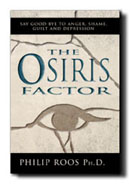|
 The
Osiris Factor The
Osiris Factor
Phillip Roos PH.D
Bonneville
Books
Interesting read
... Recommended .. 5 stars
New Solutions for overcoming
human destructiveness. Table of Contents includes a Foreword
by Lee Nelson who explains: Osiris was an Egyptian god who judged
people, often unfairly, when they died. "The Osiris Factor"
is about the unnecessary judging we do in our lives, that frequently
results in anger, guilt, shame and eventually depression, and
how all this can be avoided. Introduction while the book notes
the terrorist attacks against the United States "The Osiris
Factor" is not about terrorism. Rather, the author states
the book deals with everyday problems of the average person.
One: The Common Element the author reveals most people are responsible
for most of their problems, usually they do not know how they
sabotage themselves. People in general tend to tell themselves
something is and something should. I am wrong, and I should be
different, Some is wrong, and someone should be different. The
'should' is the thing that causes us a lot of grief.
Two: Living in Two Unreal Worlds
We all cling to the fantasy world we held as a child even after
we face the perceived world around us. Three: Beliefs beliefs
about self, about the world and about relationships are all discussed.
Fantasy and Perceived world beliefs and troublesome beliefs are
discussed before a plan for constructing new beliefs is presented.
Four: Mental Movies, we get caught up in mental movies when we
shift our attention from the world around us to our inner world.
Five: Goals learning what works
and what does not helps us in formulating the goals we need to
overcome the 'should'. Six: Reprogramming "The Osiris Factor"
because we judge ourselves and others, assign blame fault we
experience life as a series of trials and prosecutions producing
anger, guilt, shame and depression filled with 'should' 'must'
'ought'. Seven: Good-bye to Anger The first step to reducing
anger is to consciously decide to not become angry. Eight: Overcoming
Depression overgeneralization, biological imbalance, behavior
all contribute to depression. Depression is one of three forms
of sadness. Normal, appropriate reaction to upset is unhappiness.
Grief is a normal reaction to loss. Depression is an abnormal,
potentially crippling reaction to loss or upset. Nine: Our internal
Committee Difficult decisions often involve internal conflict.
It is as though we are composed of an internal committee. Ten:
The Osiris Factor and The Self Self-Esteem is the result of The
Osiris Principle applied to the self. Recent polls show self
esteem ranked among the top five values listed. Eleven: Life
without The Osiris Factor. The last chapter shows how life can
change when we replace the Osiris Factor with the Humility Factor,
we are not god, when we accept that we are human our lives change.
Bibliography Bibliography included in the back of the book covers
a broad spectrum of works.
Writer Roos draws from his successful
practice for the material fleshing out his work. "The Osiris
Factor" is written in plain, clearly understood language
and is meant for use by the layman as well as others in the field
of counseling. Dr. Roos is a licensed clinical psychologist who
has come to the conclusion that we are often our own worst enemy.
"The Osiris Factor" provides insight into many of the
foibles we humans tend to pile upon ourselves.
"The Osiris Factor"
is a well written treatise filled with excellent suggestions
for eliminating much of the guilt producing activity we engage
in each day. Dr Roos offers recommendations for enriching our
lives by changing our thinking, attitudes and need for placing
blame or guilt upon ourselves or others. Roos presents a keenly
focused work meant to be read and then read again when things
begin to overcome us. Excellent book for the home library, those
who want to better their lives, and for the professional.
Happy to recommend. |